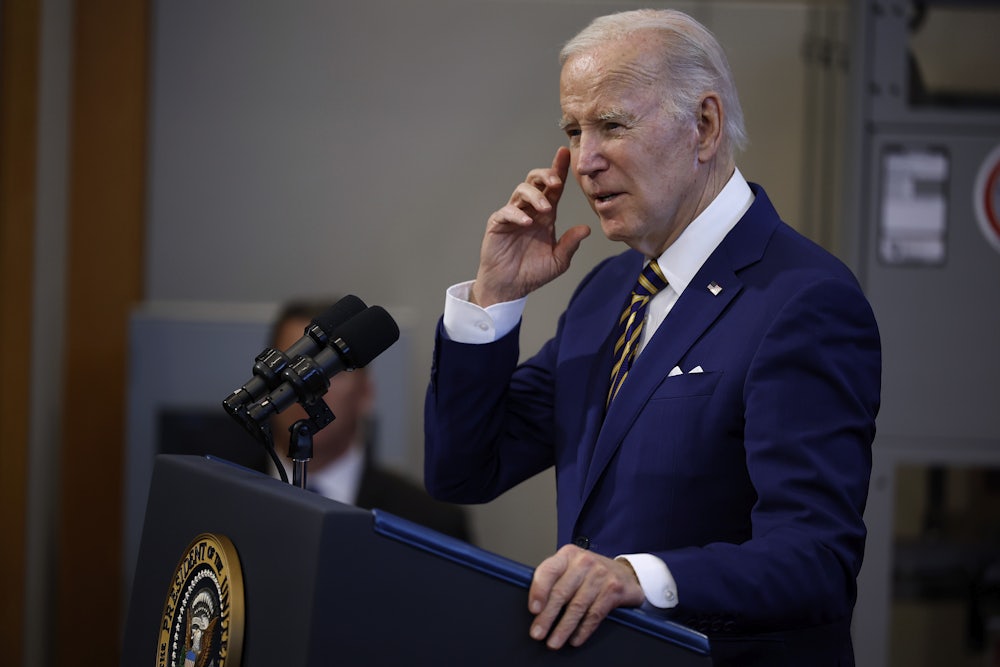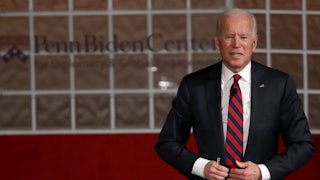It may be moot if Joe Biden runs for the Democratic nomination unopposed, but, at the moment, the 2024 primary schedule is poised to be a complete mess. And if the president decides at the last minute that he is not seeking a second term, the calendar chaos threatens to confuse voters and disadvantage the Democrats at a time when the Republicans are anointing their 2024 nominee.
For most Democrats, the storyline ended with Joe Biden’s surprise announcement in early December that—in the name of diversity—he wanted to dislodge the Iowa caucuses and the New Hampshire primary from their traditional positions at the front of the schedule. The new calendar, officially ratified this month by the Democratic National Committee, would begin in South Carolina (the state that did the most to propel Joe Biden to the 2020 nomination) on February 3. Three days later, New Hampshire and Nevada would hold their primaries on the same day. Then Georgia—which has become the favorite state of national Democrats—would vote on February 13. And finally, the early phase of the primary calendar would wrap up in Michigan on February 27.
But less than a year before the first votes will be cast for president in 2024, the Biden calendar rewrite is as aspirational as the president’s budget faced with the opposition of a Republican House.
New Hampshire, determined to preserve its century-old, first-in-the-nation status, will almost certainly move its primary to January to get ahead of South Carolina. Meanwhile, Georgia will not be holding an early primary, despite the DNC’s fast-forward schedule. Brad Raffensperger, Georgia’s Republican secretary of state who sets the presidential primary date for both parties, has made it clear that any calendar change won’t take effect until 2028.
What this means, despite all the frantic efforts from the Biden White House, is that there are only three fixed dates on the 2024 Democratic calendar: South Carolina (February 3), Nevada (February 6), and Michigan (February 27). One problem is triggered by New Hampshire’s determination to go rogue—and there is also talk in Iowa of holding an unsanctioned caucus. But what few have yet realized is that Georgia’s inability to abide by the mandates of the DNC creates a weird three-week gap between Nevada and Michigan. In 2000, when the Democrats had an even stranger five-week lag between the New Hampshire primary and the Super Tuesday contests, national attention became riveted on John McCain’s maverick effort to dislodge George W. Bush.
The DNC voted to grant New Hampshire and Georgia extensions until June 3 to comply with the party’s new mandates. No one wants to punish Georgia for resistance by a GOP secretary of state. But New Hampshire is being treated like a rambunctious ninth grader headed straight toward the principal’s office. There is no way that the Granite State will escape the wrath of the party.
The DNC has a limited arsenal of punishments. At the wrist-slap level, the national party could cut the number of delegates allocated to New Hampshire and guarantee that the Granite State has the worst hotel rooms in the convention city (likely to be New York, Chicago, or Atlanta). But what matters to New Hampshire is how much time candidates (and reporters) spend in the state—and not the delegate penalty, which would likely be lifted before the convention.
Then there is the nuclear option, a penalty so draconian that no one likes spelling it out in public. The DNC could decree that any candidate who files to be on the ballot in New Hampshire or campaigns in its outlaw primary would be barred from any party-sponsored candidate debate.
None of this is lost on New Hampshire Democrats. Ray Buckley, the state party chair, told me, “My whole message in the final week before the DNC met wasn’t about the schedule, but about the penalty. My whole position is not to have a penalty that will impact on New Hampshire in November 2024.” Implicit in Buckley’s words is the reality that New Hampshire is willing to risk having its delegation downsized but state Democrats are panicked that a campaigning ban could cost the party in the presidential election, since it is the only up-for-grabs state in the Northeast. As recently as 2016, Hillary Clinton won New Hampshire by fewer than 3,000 votes.
No matter what the punishment, Biden risks embarrassment in New Hampshire, assuming he runs for reelection. A University of New Hampshire Survey Center poll, conducted in late January, found that only 27 percent of Democrats in the state want Biden to seek a second term. What that suggests is that there could be a significant protest vote against Biden in the New Hampshire primary. It could take the form of support for a currently unknown anti-Biden candidate. Or it could be that an effort by local Democrats to write in Biden’s name flounders badly.
The truth—often forgotten by political insiders and campaign reporters—is that primaries can be unpredictable. At this point in 1967, no one could have imagined that Eugene McCarthy, a little-known anti-war senator, would run so strongly against a write-in campaign for Lyndon Johnson in the 1968 New Hampshire primary that he would drive LBJ from the presidential race. Equally unforeseen was right-wing columnist Pat Buchanan’s strong challenge to incumbent George H.W. Bush in the 1992 New Hampshire primary that ended up weakening the GOP ticket in November.
If Biden at the last minute decides not to run in 2024, a case could be made that New Hampshire might be more influential for the Democrats if it held its primary on the officially sanctioned date of February 6. The three-week gap until Michigan on February 27 would mean that the results from New Hampshire and Nevada would shape the political conversation for most of February. And with Nevada in the Pacific Time Zone and requiring most candidates to spend a large chunk of a day in the air to get to Las Vegas, the New Hampshire primary would almost certainly garner more candidate attention.
The Democrats’ calendar chaos should serve as a reminder that a key rule of politics, just like medicine, is “first do no harm.” Had the Biden White House merely done the minimum by ousting the low-turnout Iowa caucuses (both undemocratic and unable to count votes) from the opening-gun position, the party would be in better shape today. Biden could happily campaign in New Hampshire, which may again be a swing state in 2024. And then after Nevada, South Carolina (with a majority Black vote on the Democratic side) could maintain its recent role as the state where often everything is decided. Instead, the Biden political team is now dealing with the aftereffects of a ham-handed effort at political overreach.






